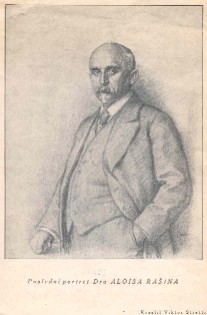  |
| Úvodní stránka | Rejstřík děl | Rejstřík autorů | O Zlatém fondu | Kontaktní informace |
Rašín was born in 1867 in the region below the Krkonoše Mountains as the ninth child of a provincial baker. After graduating from university in 1891, he released a publication, Czech State Law, in which he defined his program for the reconstruct of the Czech state. Two years later he, as one of the leaders of a fabricated secret society Omladina (The Young Ones), was jailed for two years. He served in Bory by Pilsen. After his marriage in 1899 he started his law firm and during the following years he acquired varied experience as an economic journalist, a member of the leaders of the Young Czech Party and a member of parliament of the Council of the Empire. During the World War in summer 1915 he was arrested together with Kramář, and a year later he was condemned to death because of his resistance against the Hapsburgs. In prison he was active, read intensively, and wrote the research paper, National Economy. In summer of 1917 he was awarded amnesty by the new emperor and set at large. During the following months he became one of the main leaders of the preparations and proclamation of the CSR, in the conditions of the post-war economic disintegration and great inflation, in the atmosphere of strong arguments about social and political reform of the state and the course of its economic policy. On 16th November 1917 Rašín took over the ministry building and consequently began to establish the ministry and started its work. Firstly, he began to constitute the system of monetary policy of the new state and to prepare the secret operation of economic and monetary independence of the nascent republic. After three months of preparation, he carried out the whole operation of stamping Austrian banknotes within seven days at the beginning of March 1919. Thanks to his firmness and exceptional organizational abilities, it was done promptly and without any problems. Concurrently an inventory of the property of the inhabitants was made so property taxes could be introduced.. A month later he secured the production of the first Czechoslovak banknotes. A month after that he presented the first state budget to the parliament. Moreover, these all were done within half a year. He did not lose influence on the course of public events even after his withdrawal from government, when his party (the Czechoslovak National Democratic Party) lost in the regional elections and became an opposition party. Towards the end of 1921 he in fact took one of key positions in the state as a member of the four-member board of the Trade Bank and the so-called Five, a board of members of representatives of Czech political parties that decided fundamental political and economic issues. On 7 October 1922 he became the minister of finance for the second time, in Švehla´s government. It was at the time when social tension was growing and Rašín's popularity rapidly fell. Despite this fact he insisted on maximum stringency of public expenditures and in the private sector in order to maintain currency value. He became the subject of sharp criticism to which he responded in the same manner. In this atmosphere his life was finished before its time because of a nineteen-year-old insurance clerk, the anarchist Šoupal. He died from the wounds of the assassination at the age of 55. How was Alois Rašín's work accepted and assessed? First Rašín's
biographer, the journalist Penízek, wrote that all Rašín's activities are conveyed in the following words
(rhymes in Czech: bořil, tvořil, spořil): he was destroying, building, and
saving
up. Rašín was a typical liberalist who based his ideas on individualism in politics and economic
life. Czech professor Vencovský, a prominent specialist in the history of
Czech economic thought
wrote: Alois Rašín as a scientist did not enter Czech economic thought as a
theoretically-oriented creative figure, but as an energetic politician and a intransigent
economist, who managed to apply fundamental theoretical knowledge in complex and often conflict
situations. Mgr. Vladimír Seidl On this page there can be found the following from the works of A. Rašín: Speeches of the Minister of Finance Alois Rašín On Transitory Economy. Praha, 1918My Financial Plan. Praha, 1920 National Economy. Praha, 1922 Inflation and Deflation. Praha, 1922 Financial and Economic Policy up to the End of 1921. Praha, 1922 |
| Design © Grafické studio VLADO | ||||
